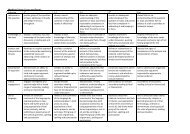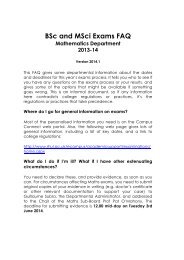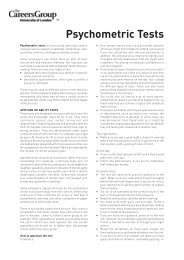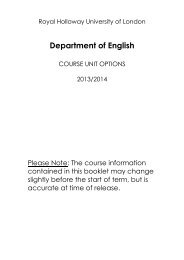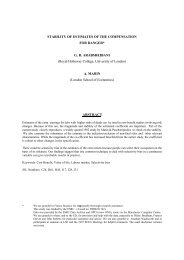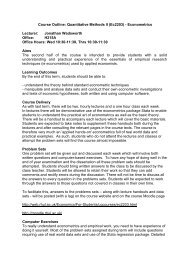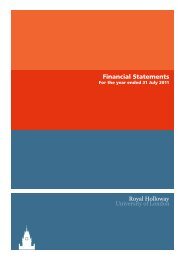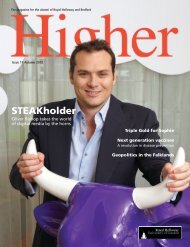Sports Nutrition – Nutrient Timing
Sports Nutrition – Nutrient Timing
Sports Nutrition – Nutrient Timing
You also want an ePaper? Increase the reach of your titles
YUMPU automatically turns print PDFs into web optimized ePapers that Google loves.
opyright 20012©The Right <strong>Nutrition</strong><br />
<strong>Sports</strong> <strong>Nutrition</strong> <strong>–</strong> <strong>Nutrient</strong> <strong>Timing</strong><br />
Wednesday 3 rd October 2012<br />
Presented by Theresa Millman<br />
Clinical <strong>Nutrition</strong> and <strong>Sports</strong> <strong>Nutrition</strong><br />
Therapist
Overview<br />
1. Optimal <strong>Sports</strong> <strong>Nutrition</strong> <strong>–</strong> Performance, Energy & Stamina<br />
2. Macro <strong>Nutrient</strong>s & <strong>Nutrient</strong> timing<br />
3. Putting it into Practice<br />
4. Supplements<br />
5. Q&A<br />
✔<br />
✔<br />
✔<br />
✔<br />
opyright 20012©The Right <strong>Nutrition</strong>
opyright 20012©The Right <strong>Nutrition</strong><br />
Performance <strong>–</strong> A <strong>Nutrition</strong>al Approach<br />
Question:<br />
• As a percentage how much do you think nutrition affects athletic<br />
performance?
opyright 20012©The Right <strong>Nutrition</strong><br />
Answer:<br />
100%
opyright 20012©The Right <strong>Nutrition</strong><br />
“<strong>Nutrition</strong> cannot substitute for raw talent,<br />
training, mental preparation or equipment,<br />
but bad nutrition can destroy performance.”<br />
Stone Research Foundation, June 2005
opyright 20012©The Right <strong>Nutrition</strong><br />
<strong>Sports</strong> Performance<br />
Key Goals:<br />
• Improve performance <strong>–</strong> endurance, energy, stamina and strength<br />
• Reduce injury<br />
• Better recovery<br />
• Are all underpinned by: good nutrition, hydration and rest
Recognising Signs & Symptoms<br />
Lack of<br />
concentration??<br />
POOR MEMORY<br />
Can’t<br />
handle<br />
stress<br />
Every thing is<br />
a real effort!!<br />
opyright 20012©The Right <strong>Nutrition</strong><br />
low<br />
productivity<br />
Feel sleepy in<br />
the afternoon<br />
LESS<br />
TOLERANT!!!<br />
MILD<br />
DEPRESSION<br />
low<br />
sex<br />
drive<br />
Crave<br />
Stimulants<br />
mood<br />
swings<br />
ANXIETY..<br />
Tired in afternoon<br />
STRESSED!!!!!<br />
&<br />
wide awake in evenings<br />
Feel sleepy at 3pm<br />
No Motivation…<br />
Increased<br />
PMS!!!!<br />
FEEL TIRED<br />
ALL THE TIME<br />
Need caffeine<br />
to get going?<br />
Have less<br />
zest for life<br />
EASILY RAGED!<br />
Can’t get<br />
out of bed<br />
Lack of<br />
interest in life<br />
longer illness<br />
recovery times
opyright 20012©The Right <strong>Nutrition</strong><br />
Balancing Energy Levels<br />
• Balancing energy levels is controlled by balancing blood sugars<br />
• Poor energy control can contribute to the “3pm low”, weight gain<br />
and sluggish body systems<br />
• Very common in athletes and needs a little bit of planning to avoid<br />
• Two main causes of blood sugar imbalances:<br />
<strong>–</strong> Sugary (refined) food and drink choices<br />
<strong>–</strong> Erratic eating and large meals
opyright 20012©The Right <strong>Nutrition</strong><br />
<strong>Nutrient</strong> timing: Balancing blood sugar<br />
Blood sugar<br />
Lunch<br />
Imbalanced<br />
Fluctuations caused by:<br />
• Energy dense<br />
foods/drinks (sweet<br />
foods)<br />
• Alcohol<br />
• Stress?<br />
• Caffeine?<br />
Sugar<br />
cereal<br />
• Nicotine<br />
Normal<br />
Leads to:<br />
• Energy imbalances<br />
• Diabetes<br />
Wake<br />
Crave<br />
Coffee/biscuits<br />
• Weight gain<br />
• Fatigue<br />
10.30-11am 3-4pm 5-6pm<br />
Time
opyright 20012©The Right <strong>Nutrition</strong><br />
<strong>Nutrient</strong> <strong>Timing</strong> - Low and High GI<br />
Blood Sugar Level (mg/100ml)<br />
280<br />
240<br />
200<br />
160<br />
120<br />
80<br />
40<br />
High GI foods:<br />
Balanced blood White rice, white pasta<br />
Exercise<br />
sugar curve white All bread, meals / snacks<br />
Exercise<br />
sugar, pastry, cakes,<br />
low/medium GI biscuits, contain: sweets, chocolate, fizzy<br />
foods Stress, stimulants: drinks, tropical Protein caffeine, fruits, nicotine alcohol<br />
PROCESSED complex High GI Carbohydrate<br />
/ REFINED / STARCHY<br />
Insulin FOODS foods healthful EATEN Fat IN ISOLATION<br />
release<br />
Brains main fuel is glucose / SUGAR!!!<br />
Leading to cravings and blood sugar fluctuations<br />
2 teaspoons of glucose (sugar) in blood at rest<br />
Hypoglycaemic!!<br />
0 0.5 1 1.5 2 2.5 3 3.5 4 4.5 5<br />
Time after glucose intake (hrs)
opyright 20012©The Right <strong>Nutrition</strong><br />
Balancing Energy Levels<br />
Practical steps:<br />
• Eat little and often - many athletes eat 5- 6 smaller meal/snacks<br />
per day.<br />
• Eat slow sugar release foods (at rest) (COMPLEX CARB<br />
EXPERIMENT)<br />
• Take time over food (don’t scoff)<br />
• Buy and keep appropriate snacks to hand<br />
• Try and avoid caffeinated drinks (coke and coffee especially) at rest<br />
• At rest ensure every meal and every snack contains healthful<br />
protein, fat and carbohydrates
opyright 20012©The Right <strong>Nutrition</strong><br />
Balancing Energy Levels<br />
Snacks:<br />
• Handful of nuts and dried fruit<br />
• Oatcakes with nut butters<br />
• Chopped vegetables with Hummus<br />
• Olives<br />
• Natural live yoghurt with seeds and berries<br />
• Apple with a tablespoon of cottage cheese or small piece of other<br />
cheese<br />
• Berry fruits with seeds
opyright 20012©The Right <strong>Nutrition</strong><br />
<strong>Nutrient</strong> <strong>Timing</strong><br />
• At Rest: Protein with every meal<br />
<strong>–</strong> Meals should contain protein, complex carbohydrates and healthful fats<br />
• Before Exercise:<br />
<strong>–</strong> Endurance: Medium (High) GI meal / snack (1-2 hours)<br />
<strong>–</strong> Strength: Protein (Carb)<br />
• During Exercise:<br />
<strong>–</strong> Drink to your thirst<br />
• After Exercise: Carbohydrate / Protein Recovery meal/drink<br />
<strong>–</strong> Carb to Protein in a 5-1 ratio. Immediately after exercise (within 45<br />
mins)
opyright 20012©The Right <strong>Nutrition</strong><br />
Before Exercise<br />
• 0.5g-3g of carbohydrates per kg bodyweight<br />
• 1 - 2 hours before exercise <strong>–</strong> leave enough time for food to settle<br />
• Use low GI carbohydrates (with a little fat/protein) such as:<br />
<strong>–</strong> sweet potato, porridge, soy beans, chickpeas, baked beans, lentils,<br />
brown rice, corn, whole meal pasta, vegetables<br />
• Pre-workout snacks (@1hrs before): fresh fruit, dried fruit, fruit<br />
smoothies, protein shake, fruit bread. Med/high GI foods<br />
<strong>–</strong> Muscle gains: 6-20g Protein + Carbs 30mins pre resistance training<br />
• <strong>Timing</strong>s must be practiced. Eat too close to exercise and stomach<br />
cramps, food fermentation and gas develop. Eat too far from<br />
exercise and hypoglycaemia results
opyright 20012©The Right <strong>Nutrition</strong><br />
During Exercise<br />
Exercise lasting longer than 60mins + moderate-high intensity<br />
• 30-60g carbohydrates per hour*<br />
• Use high GI foods such as:<br />
<strong>–</strong> sports drinks or diluted juices (6g/100ml) absorbed easily, quickly in the<br />
stomach and small intestine. They also provide fluid for hydration<br />
<strong>–</strong> Solid foods such as raisins, sultanas, bananas must be consumed with<br />
water. These will take longer to digest and be absorbed.<br />
ALL NUTRITION DURING EXERCISE MUST BE TESTED BEFORE<br />
EVENTS. THERE IS NO PRESCRIBED FORMULA FOR<br />
INDIVIDUALITY<br />
*Coggan A.R. & Coyle E.F (1991), Carbohydrate ingestion during prolonged exercise: effects on<br />
metabolism and performance, Exercise Sport Science Reviews. 1991;19:1-40. PubMed
opyright 20012©The Right <strong>Nutrition</strong><br />
Post Exercise<br />
Time Line:<br />
• Immediately - 45mins: Combine carbs / protein post exercise has<br />
been shown to improve glycogen recovery, it stimulates insulin<br />
release and so greater muscle glucose and amino acid uptake<br />
• More than 2hrs: Low GI foods<br />
• If initial eating is delayed muscles glycogen replenishment and<br />
protein synthesis is dramatically reduced (this can last up to 16<br />
hours)<br />
Ivy J. & Portman, R. (2004) <strong>Nutrient</strong> <strong>Timing</strong>. Basic Health Publications Inc., New Jersey,<br />
USA.
opyright 20012©The Right <strong>Nutrition</strong><br />
Post Exercise<br />
• Ideal ratio 5:1 / Carbohydrate : Protein<br />
• Promotes the release of insulin = stimulates muscle glycogen<br />
replacement<br />
• Stimulates transport of amino acids into muscle cells = promoting<br />
protein synthesis and blunting cortisol levels<br />
• Cortisol suppresses the rate of protein synthesis and stimulates<br />
protein catabolism (breakdown)
opyright 20012©The Right <strong>Nutrition</strong><br />
Post Exercise<br />
50 grams of carbohydrate with at least 10 grams of protein:<br />
• 200 g fruit flavoured yoghurt with 1 cup fruit salad<br />
• 60 grams breakfast cereal with 1⁄2 cup milk<br />
• Fruit smoothie/milk shake (250-350 ml)<br />
• Liquid meal supplement (250-350 ml)<br />
• Wholegrain sandwich with meat/cheese filling and 300 ml sports<br />
drink<br />
• 250 g baked beans with 2 pieces of wholegrain toast<br />
• 250 g baked potato with cottage cheese filling<br />
• 2 crumpets with nut butter (thick spread)<br />
• Berries with Seeds
opyright 20012©The Right <strong>Nutrition</strong><br />
Protein Needs in Training<br />
• Much debate about protein requirements<br />
• Recent evidence suggests dietary protein increases with rigorous<br />
physical exercise<br />
• Strength training may need to consume 1.6 to 1.7 g protein x kg/<br />
day (approx: twice current RDA)<br />
• Endurance training may need about 1.2 to 1.6 g x kg/day (approx<br />
1.5 times the current RDA)
opyright 20012©The Right <strong>Nutrition</strong><br />
A Day of Protein<br />
Quantity of food required to provide needs for a 70 kg<br />
athlete<br />
Amount of<br />
protein (g)<br />
Breakfast 2 cups cereal ! 6!<br />
300 ml milk! 12!<br />
2 slices toast! 8 !<br />
2 tablespoons jam! 0!<br />
1 cup juice! 2!<br />
Lunch 2 bread rolls! !<br />
each with 50 g chicken+ salad! 41!<br />
1 banana! 2!<br />
1 fruit bun! 6!<br />
250 ml flavoured low fat milk! 13!<br />
Dinner<br />
Stir-fry with 2 cups pasta + 100 g meat+<br />
50!<br />
1 cup vegetables!<br />
1 cup jelly+ 1 cup custard! 13!<br />
! !<br />
Snacks 750 ml sports drink ! 0!<br />
1 carton yoghurt ! 10!<br />
1 piece fruit! 1 !<br />
1 cereal bar! 2!<br />
Analysis ! 166 g (2.3 g/kg)!<br />
!
opyright 20012©The Right <strong>Nutrition</strong><br />
Examples of Protein Foods<br />
Protein<br />
Fish fillets, 3.5 oz<br />
Tuna, 6 oz can<br />
Chicken thigh<br />
Chicken breast, 3.5 oz<br />
Drumstick<br />
Egg, large<br />
Cottage cheese, 1⁄2 cup<br />
Pork chop, average<br />
Ham, 3 oz serving<br />
Grams<br />
22 gms<br />
40 gms<br />
10 gms<br />
30 gms<br />
11 gms<br />
7 gms<br />
15 gms<br />
22 gms<br />
19 gms<br />
2 scoops of Whey Protein 10 gms
opyright 20012©The Right <strong>Nutrition</strong><br />
Hydration<br />
• Water is undoubtedly the most important compound in the body<br />
• We are 70% water<br />
• Lessens burden on liver & kidneys <strong>–</strong> helps flush out toxins via urine<br />
<strong>–</strong> a build up of toxins can influence mood and energy levels<br />
• Moistens tissues: i.e. mouth, eyes, nose<br />
• Regulates body temperature<br />
• Prevents constipation<br />
• Lubricates joints<br />
• Helps dissolve minerals and nutrients so they are<br />
available to the body
opyright 20012©The Right <strong>Nutrition</strong><br />
Hydration<br />
Urine frequency or color<br />
has nothing to do with<br />
hydration or kidney<br />
function.<br />
Urine Colour<br />
Chart
opyright 20012©The Right <strong>Nutrition</strong><br />
Hydration<br />
• Drink only to thirst, not on a schedule.<br />
• Drinking does not prevent heat illness.<br />
• Ingesting salt is unnecessary in ultras.<br />
• Urine frequency or color has nothing to do with hydration or kidney<br />
function.<br />
“Individual differences are too great to make blanket<br />
recommendations. The only gauge for fluid need is thirst; the only<br />
symptom of dehydration is thirst”<br />
Tim Noakes MD, Waterlogged 2012,<br />
Author of over 250 research papers in sports / ultra racing.
opyright 20012©The Right <strong>Nutrition</strong><br />
Supplements???<br />
• <strong>Sports</strong> world is filled with pills, potions, powders, bars and drinks<br />
that promise to give the athlete a winning edge<br />
• If you are striving to be at the top, how can you afford to miss out<br />
on these miracles?<br />
• And can you afford for your competitors to have these advantages if<br />
you don't?<br />
Australian Institute of Sport, Supplements in Sport - Why are they so tempting?
opyright 20012©The Right <strong>Nutrition</strong><br />
Supplements<br />
Pros:<br />
• Convenience<br />
• Many athletes are short on key nutrients<br />
• Can aid better recovery and support immunity<br />
Cons:<br />
• Are expensive<br />
• Marketing companies make claims<br />
• Many athletes will forgo eating well by supplementing
opyright 20012©The Right <strong>Nutrition</strong><br />
Problems with current supplement<br />
practices by athletes<br />
• Strategies that genuinely enhance performance:<br />
<strong>–</strong> specialized training<br />
<strong>–</strong> sound nutrition practice<br />
<strong>–</strong> good equipment<br />
<strong>–</strong> adequate rest and sleep<br />
<strong>–</strong> mental preparation<br />
• Food is often over looked in favour of supplements<br />
• Adhoc use of supplements are of little value, i.e. not used in the<br />
manner that achieves optimal outcomes<br />
• Supplements only show benefits in those who are untrained<br />
Australian Institute of Sport, Supplements in Sport - Why are they so tempting?
What to eat……<br />
opyright 20012©The Right <strong>Nutrition</strong>
opyright 20012©The Right <strong>Nutrition</strong><br />
A <strong>Nutrition</strong>ists dream…..<br />
Breakfast<br />
No time Some time Lots of time<br />
Yogurt & fruit<br />
Muesli bar<br />
Snacks<br />
Muesli, fruit & yogurt/<br />
milk<br />
Granola, fruit & yogurt/<br />
milk<br />
Toast with nut butter<br />
Eggs (2-3) & granary/<br />
seeded toast<br />
Porridge & berries/<br />
stewed fruit<br />
No time Some time Lots of time<br />
Muesli bar Yogurt (natural) Granola<br />
Handful nuts & seeds<br />
Fruit<br />
Hummous & oat cakes<br />
Hummous & carrots<br />
Remember your 5-a-day!
opyright 20012©The Right <strong>Nutrition</strong><br />
A <strong>Nutrition</strong>ists dream…..<br />
Lunch<br />
No time Some time Lots of time<br />
Purchased wrap/pitta<br />
bread<br />
Protein; chicken, tuna,<br />
salmon, pork<br />
Leftovers from dinner<br />
Canteen food <strong>–</strong> avoiding<br />
rich sauces, fried food<br />
Soup & bread<br />
Salad with protein<br />
Homemade sandwich<br />
with wrap/pitta bread<br />
Homemade soup<br />
Dinner<br />
No time Some time Lots of time<br />
Eggs & toast Omelette & veg Roast dinner & veg<br />
Sardines on toast<br />
Baked potato with tuna/<br />
beans/cottage cheese<br />
Stir-fry<br />
Remember your 5-a-day!
opyright 20012©The Right <strong>Nutrition</strong><br />
Aldi Tesco Sainsbury’s<br />
Muesli 0.89 1.18 1.18<br />
Optifit Active Yogurt 0.99 1.25 1.84<br />
Bread 0.69 0.47 0.75<br />
Peanut butter 0.92 0.62 0.62<br />
Eggs 0.99 1.48 0.85<br />
Carrots 0.39 1.00 1.00<br />
Broccoli 0.39 0.75 1.00<br />
Lettuce 0.39 0.50 0.90<br />
Potatoes 0.39 1.00 1.50<br />
mushrooms 0.79 0.97 1.00<br />
mixed peppers 1.39 1.00 1.65<br />
Cucumber 0.59 0.80 0.80<br />
tomatoes 0.89 1.50 1.10<br />
onions 0.39 0.69 0.95<br />
oranges 0.99 1.75 1.50<br />
Oatcakes 0.69 0.79 0.69<br />
nut and fruit mix 0.59 0.70 0.89<br />
Baked Beans 0.32 0.26 0.28<br />
Chicken breast fillets x4 3.99 4.00 4.00<br />
Bacon 0.79 1.50 1.50<br />
mackerel 0.69 0.89 0.89<br />
Beef mince 2.09 2.80 2.70<br />
Tuna 0.54 0.62 0.75<br />
Milk 0.41 0.89 0.89<br />
soft cheese 0.49 0.50 0.83<br />
Cider 0.99 1.89 2.15<br />
Pasta 0.78 0.95 0.39<br />
fajita kit 1.49 2.00 2.14<br />
Cost of Food<br />
Total 24.94 32.75 34.74<br />
!
opyright 20012©The Right <strong>Nutrition</strong><br />
Questions?<br />
For further information about sports nutrition, general health and<br />
nutrition, or a copy of the menu/meal plans contact:<br />
Theresa Millman - The Right <strong>Nutrition</strong> for Sport<br />
Phone:07850 115038<br />
Web: www.therightnutrition.co.uk<br />
Email: contact@therightnutrition.co.uk
opyright 20012©The Right <strong>Nutrition</strong><br />
Links<br />
• Noakes, T. (2012), Waterlogged: the serious problem of<br />
overhydration in endurance sports<br />
• British Cycling: Road to Glory<br />
• BBC One - Panorama, The Truth About <strong>Sports</strong> Products<br />
• Australian Instiute of Sport <strong>–</strong> <strong>Nutrition</strong> pages<br />
www.ausport.gove.au/ais/nutrition<br />
• Journal of the International Society of <strong>Sports</strong> <strong>Nutrition</strong> (JISSN)<br />
www.jissn.com




